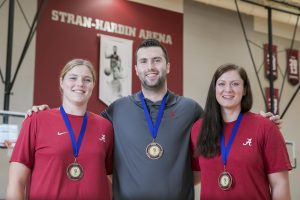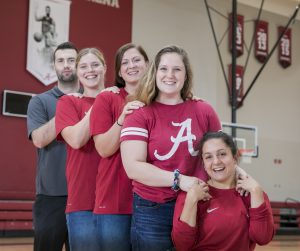By David Miller

After three torn ACLs, Katharina Lang’s club basketball career was over.
She had played since she was 5 and won a German national championship at age 16. But after the third knee injury, the news and disappointment from her followers spread across the gyms: “she’s injured again.”
“After all the surgeries, I wanted to come back again, play first and second league and be fit,” Lang said. “And if you have a twin who is playing all the time and is not injured, it’s mentally hard to get through.”
Lang found an unlikely outlet for her favorite sport: wheelchair basketball, a sport with championship-level infrastructure in Germany, both at the club level and internationally. She began playing coed ball in Germany three years ago, acclimating to the physicality of the game and working to replicate the skills cultivated in able-bodied ball to adapted sport.
“When I began playing, 50 percent of me was happy to have the chance to play,” Lang said. “But on the other hand, every time I failed, I thought about how good I was at able-bodied basketball. When you realize you can’t go back, it’s a hit in the face.”
Winning a medal in an international competition can help ease those growing pains in the sport. Despite her relative inexperience in the sport, Lang clinched the final spot for Germany’s national team that competed in the Wheelchair Basketball World Championships last month, where she won a bronze medal. Lang was one of five UA adapted athletes representing three countries at Worlds, and one of three to medal, including her German teammate, Barbara “Babsi” Gross.
“We were so happy to win a medal, especially as a young and new player,” Lang said. “I’m so motivated to start into the season and fight for a (collegiate) championship title this year.”
Learn more about Lang’s path to her first international medal in this video.
Support systems
Lang’s transition to living, studying and competing in the United States has been made easier by her German international teammates at UA and host families in Tuscaloosa. She accepted the opportunity to attend and play at UA based on advice from Gross and former UA player and gold medalist Annika Zeyen, one of Germany’s most decorated adapted athletes.

Lang, who began her second season at UA last month, said her international success has been aided by championship-level training and coaching at UA, home to Stran-Hardin Arena, the vanguard for adapted sports venues in college ball. UA’s program has been particularly helpful in transitioning to a women’s game after cutting her teeth in coed ball in Germany.
“It’s a more physical game playing with men, but you’re also playing with a men’s ball,” Lang said. “It’s hard to change the ball during the middle of the season and get used to it, but I knew, through Babsi, that I’d be able to train in women’s ball every day here. And our gym is such a great fit; it motivates us every single day.”
Australian earns first hoops medal
Michael Auprince is no stranger to success in international competitions. The Australian earned both a gold and bronze medal in swimming at the 2012 Paralympic Games in London.
Auprince, the leading scorer and rebounder from UA’s 2018 national championship wheelchair basketball team, added his first international medal in basketball at Worlds last month.
Auprince, who began playing wheelchair basketball after the 2012 Paralympic Games, said he was fortunate to make Australia’s roster, given the level of competition in the country.
“To make the top 12 in Australia is something in itself,” Auprince said. “To walk away with a medal is rewarding and means the world to me.”
Auprince joined UA’s team in 2015 and was “on the fringes” of making his national team for the 2016 Paralympics in Rio. He was the last player cut from that team. He’s aiming for the 2020 games, and he hopes to advance his game at the same rate that helped him make Worlds this year.
Auprince said the African proverb, “it takes a village,” applies to UA Adapted Athletics, where the combination of facilities and tutelage from coaches Ford Burttram and Ryan Hynes has helped elevate his game. He said UA’s support systems resonate with other international players.
“The younger athletes are looking at my development and asking, ‘how has he gotten so good?’” Auprince said. “It’s unbelievable what a great daily training environment will do for an athlete, and when you’re surrounded by people who want to play and get better.”
